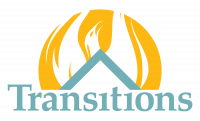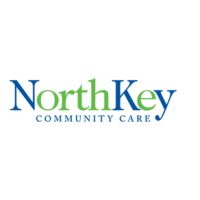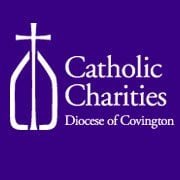
Saint Elizabeth Healthcare - Mental Health Unit
Drug Rehab Center in Florence, Kentucky
- Opioid Addiction
- Dual Diagnosis
- Drug Addiction
- Alcoholism
The Saint Elizabeth Healthcare - Mental Health Unit in Florence, Kentucky is a 197 bed inpatient addiction treatment facility that offers specialized care for individuals struggling with alcohol and drug addiction, offering comprehensive drug rehab with personalized treatment, evidence-based therapies, and access to medical and psychiatric assessments.
About This Kentucky Facility
Saint Elizabeth Healthcare - Mental Health Unit in Florence, Kentucky is a 197 bed inpatient addiction treatment facility that offers specialized care for individuals struggling with alcohol and drug addiction, dual diagnosis, and opioid abuse. They provide comprehensive drug rehab and inpatient levels of care, and are accredited by the Joint Commission (JCAHO) and SAMHSA (Substance Abuse and Mental Health Services Administration).
At Saint Elizabeth Healthcare - Mental Health Unit, their experienced and dedicated staff of mental health professionals provide personalized treatment to help individuals achieve recovery and long-term sobriety. They offer an integrated model of care, combining evidence-based therapies, individualized treatment plans, and multiple group sessions to help address addiction and mental health issues. Their evidence-based therapies include cognitive behavior therapy, trauma-informed therapy, and acceptance and commitment therapy. Additionally, their team of specialists provide access to comprehensive medical and psychiatric assessments, specialty medical care, and nutrition/dietary counseling. They also offer referrals to 12 Step programs and support groups, as well as aftercare and relapse prevention planning.
Genders
Ages
Modality
Additional
Accreditations
SAMHSA

JCAHO
Conditions and Issues Treated
Opioid abuse has become a national epidemic in the last decade. The US has one of the world’s highest rates of opioid use and abuse, as well as opioid-related deaths. Opioids are classified as Schedule II-IV controlled substances in the US due to their high potential for abuse.
Oxycodone, hydrocodone, methadone, and fentanyl are the most common Opioids and are commonly prescribed to treat pain. Tolerance to opioids develops over time, making life difficult, if not impossible, without them. Opioid users often obtain the drugs illegally. They can be drug dealers, friends, or family members who do not have valid prescriptions.
The desire for a more intense high than prescription opioids can quickly lead to heroin use. Heroin users are more prone to illness and death due to the high risk of overdose.
Many opioid addicts who seek treatment believe that the only way to overcome their addiction is through medical detox and long-term drug addiction rehab. To help patients wean off their addiction and reduce the risk of overdose, medication-assisted therapy (MAT) involves prescribing a replacement opioid. Doctors use MAT in conjunction with other anti-craving medications to help patients maintain recovery. Due to the high risk of relapse, MAT is often combined with individual and group counseling and social support programs.
When addiction and psychiatric issues co-occur, the addict’s recovery is more successful when both conditions are treated. A dual diagnosis refers to a condition in which the patient is diagnosed with two health issues: addiction and bipolar disorder. The most common therapies are psychotherapy, behavioral therapy, spiritual counseling, 12-step programs, and medication management.
Levels of Care Offered at Saint Elizabeth Healthcare - Mental Health Unit
This center offers a variety of custom treatment tailored to individual recovery. Currently available are Drug Rehab, Dual-Diagnosis, Inpatient, with additional therapies available as listed below.
Inpatient treatment centers offer a safe, secure, and often medically supervised environment for drug or alcohol-addicted individuals. Many of these facilities are equipped to provide detoxification, treatment for co-occurring mental health disorders, and aftercare programs. The patient typically spends 28 to 30 days at the facility and will receive extensive drug counseling.
Therapies & Programs
At Saint Elizabeth Healthcare - Mental Health Unit , to learn from past mistakes and improve one’s situation, the recovering person meets individually with a therapist. The counselor or therapist will address addiction causes, triggers, mental issues, dual diagnosis, and aftercare plans during this time. This is a very intense and challenging process. Some clients find it easier to open up to someone other than family or friends who understand their struggles with addiction.
In group therapy, recovering addicts meet with a therapist and other people in recovery. Some groups are closed, meaning only people who share the same addiction or problem can attend. Others are open to anyone who wants to stop using drugs or drinking alcohol. Group therapy sessions typically focus on one topic each week or month so that recovering addicts can discuss issues they face daily.
Trauma therapy allows people to face and learn from past traumas.
Many people suffer childhood traumas that lead to adult addiction. During treatment at Saint Elizabeth Healthcare - Mental Health Unit [/type], you can move forward in your recovery and reclaim your sober future! Trauma is a common cause of psychological disorders like Addiction Disorder. It’s common in Addictive Disorders patients because traumatized people have strong emotions or thoughts that lead to addictive behaviors.
Dialectical Behavior Therapy (DBT) is a type of therapy created in the late 1980s and early 1990s. It was designed to help people with high rates of suicidal behavior.
The goal of DBT is to teach mindfulness, distress tolerance, emotion regulation, and interpersonal effectiveness to help people learn how to live a life that is no longer controlled by overwhelming emotions and urges.
DBT is beneficial in treating drug addiction because it helps patients understand and cope with their cravings for drugs or alcohol rather than turning to those substances as a way of coping.
Cognitive Behavioral Therapy (CBT) is based on the idea that how we feel, think and act all interact together. It helps people explore their thoughts for problems (or false beliefs) that influence their mood and actions. CBT is very goal-oriented, which means that the therapist and patient work together on a specific problem. In addition to helping a client focus on thoughts that can be changed, CBT also allows them to take an active role in their treatment. Our thoughts determine our feelings and behaviors; our feelings affect our thoughts, and our behaviors change our thoughts and feelings.
Patient Experience
Experiential Therapy at Saint Elizabeth Healthcare - Mental Health Unit
Experiential Therapy is a different way of thinking about addiction treatment. It uses physical activities to help work through troubling emotions, memories, and trauma that are sources of psychological issues like addiction.
Experiential Therapy can be an effective option for those who have struggled with past traumas or challenges associated with life decisions such as drug use. The non-traditional approach helps people deal more effectively with these struggles. It also allows them to gain new perspectives on their behavior patterns by recreating experiences in healthy ways rather than continuing old habits that may no longer serve them.
Payment Options Accepted
For specific insurance or payment methods please contact us.
Is your insurance accepted?
Ask an expert, call (888) 674-0062
Saint Elizabeth Behavioral Health Center Associated Centers
Discover treatment facilities under the same provider.
Learn More About Saint Elizabeth Behavioral Health Center Centers
Additional Details
Specifics, location, and helpful extra information.
Florence, Kentucky 41042 Phone Number(859) 212-4215 Meta DetailsUpdated November 25, 2023
Staff Verified
Patient Reviews
There are no reviews yet. Be the first one to write one.

Location
4900 Houston Road
Florence, KY 41042
(859) 212-4215
Accreditations


Saint Elizabeth Behavioral Health Center
Language
Social Media
Quick Reference
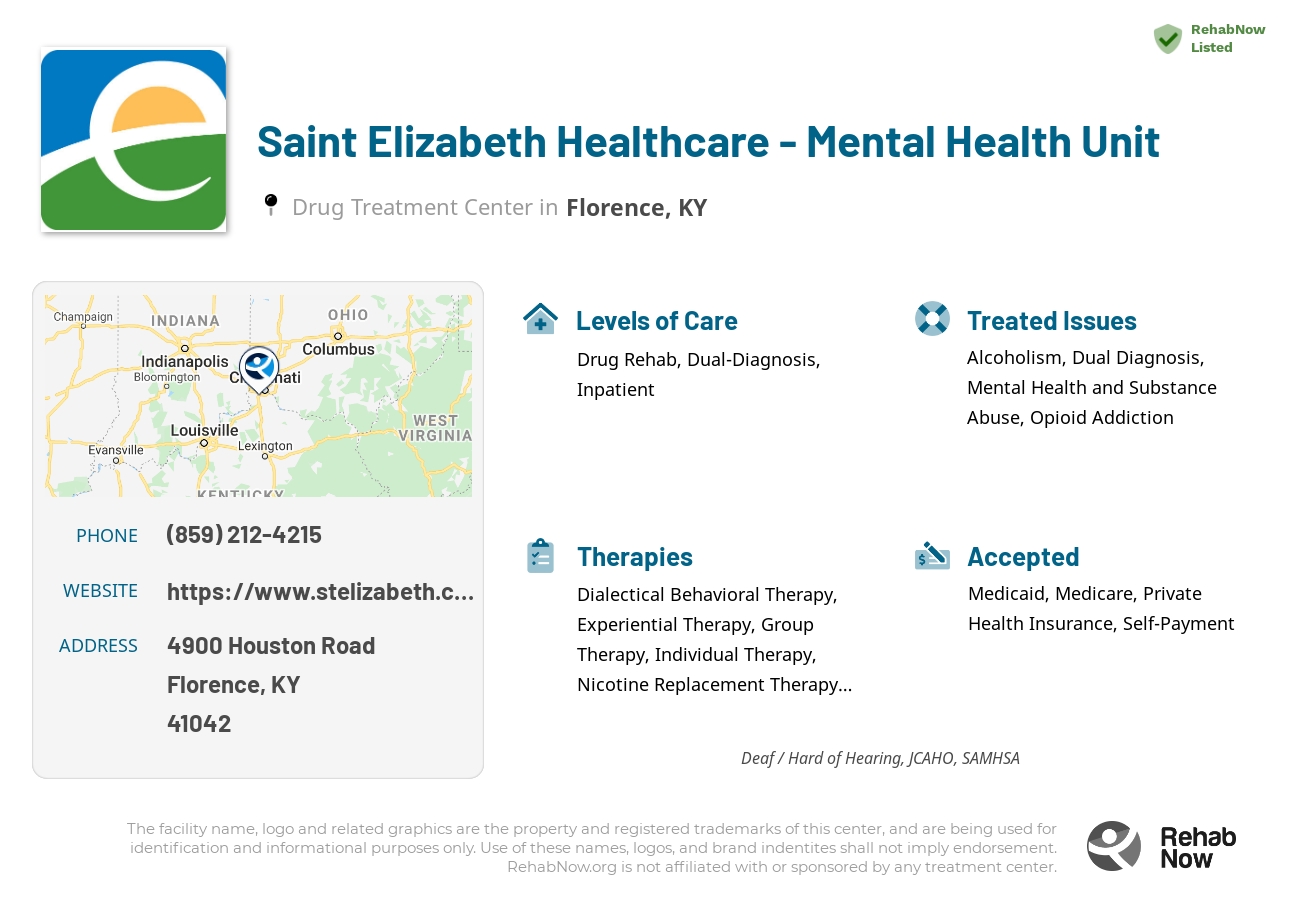
- About This Kentucky Facility
- Accreditations
- Conditions and Issues Treated
- Levels of Care Offered at Saint Elizabeth Healthcare - Mental Health Unit
- Therapies & Programs
- Patient Experience
- Payment Options Accepted
- Saint Elizabeth Behavioral Health Center Associated Centers
- Additional Details
- Patient Reviews
Florence, Kentucky Addiction Information
Kentucky ranks among the top ten states for opioid-related overdoses. Most of these are due to heroin, fentanyl, and prescription opioid use. A little over 11% of the Kentucky population abuses alcohol in a given year. More than 15% of Kentucky adults admit to participating in binge drinking every month.
2 out of every 15 teenagers in Florence are struggling with alcoholism. 8% of residents are addicted to at least one substance, including alcohol and weed. About 300 people in the region inject drugs like heroin and meth on a regular basis. 100 people die annually from a drug overdose in the area. Drug treatment centers in Florence offer specialized procedures to help people overcome their addiction to drugs and alcohol.
Treatment in Nearby Cities
- Belfry, KY (160.5 mi.)
- Mount Vernon, KY (116.1 mi.)
- Buckhorn, KY (131.3 mi.)
- Louisville, KY (80.6 mi.)
- Paris, KY (59.4 mi.)
Centers near Saint Elizabeth Healthcare - Mental Health Unit

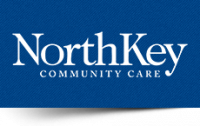

The facility name, logo and brand are the property and registered trademarks of Saint Elizabeth Healthcare - Mental Health Unit, and are being used for identification and informational purposes only. Use of these names, logos and brands shall not imply endorsement. RehabNow.org is not affiliated with or sponsored by Saint Elizabeth Healthcare - Mental Health Unit.
